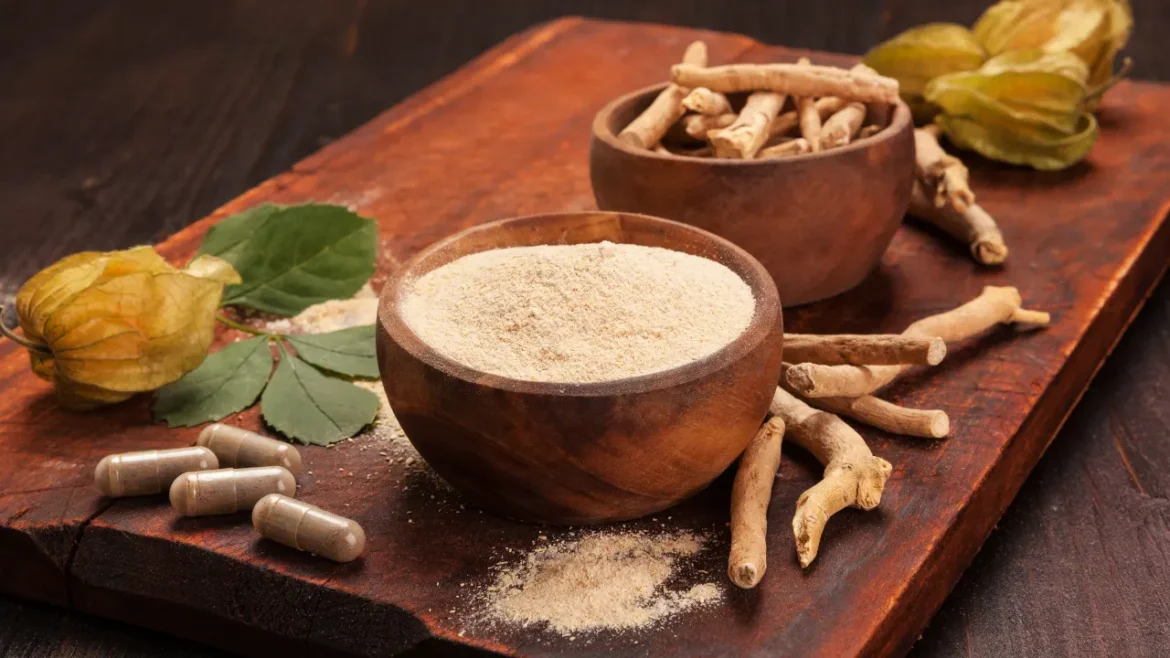A flowering shrub commonly found in India, the Middle East, and parts of Africa with possible health advantages has lately attracted attention: ashwagandha. This plant has long been used in Ayurvedic medicine for a variety of functions of the nervous system. Understanding its nature, chemistry, health advantages, ideal dose, potential adverse effects, and potential interactions with other drugs is crucial for ensuring safe administration and for better understanding its prospective applications. This article aims to provide relevant information to assist readers in making informed choices as to whether to take ashwagandha as a supplement.
You May Also Like:
Carlson Fish Oil: A Review of the Facts About This Leading Heart Health Product
Nordic Naturals Ultimate Omega + Coq10 Review: The Facts About This Leading Omega-3 Product
Nature of Ashwagandha
Ashwagandha, a popular herb originating from the Solanaceae family, is renowned for its myriad health benefits and distinctive characteristics. This ancient medicinal plant boasts small, bell-shaped flowers and a woody stem that harbors the majority of its potent compounds. Ashwagandha contains a diverse array of bioactive constituents, including alkaloids, saponins, flavonoids, and anthraquinones. Among these, alkaloids and saponins take center stage, playing a crucial role in the herb’s therapeutic properties. With a rich history steeped in traditional medicine, ashwagandha has emerged as a beloved ingredient renowned for its potential to promote overall well-being and restore balance within the body.
Alkaloids, such as somniferine, sominine, and anferine, are nitrogen-containing compounds found in ashwagandha. These alkaloids interact with enzymes and receptors throughout the body, exerting their pharmacological effects. Some alkaloids have been found to influence the neurological system by binding to neurotransmitter receptors, thereby potentially impacting mood, cognition, and pain perception. These alkaloids contribute to ashwagandha’s calming and anxiety-reducing effects.
Saponins, on the other hand, are complex glycosides found in ashwagandha. Withanolides, a specific group of saponins unique to ashwagandha, are associated with numerous health benefits. Withanolides have been found to possess anti-inflammatory, antioxidant, and immunomodulatory properties. They have the ability to modulate the immune system by enhancing the activity of immune cells and regulating inflammatory responses. Withanolides are also believed to contribute to ashwagandha’s adaptogenic properties, helping the body cope with stress and promoting overall well-being.
Flavonoids and anthraquinones are additional bioactive compounds found in ashwagandha. Flavonoids are known for their antioxidant properties, which help protect cells from oxidative damage. Anthraquinones, on the other hand, are compounds that have been studied for their potential antimicrobial effects.
The unique combination of these bioactive compounds in ashwagandha contributes to its diverse range of potential health benefits. From its ability to support cognitive function and alleviate stress to its potential immune-boosting and anti-inflammatory properties, ashwagandha has captured the attention of both traditional healers and modern researchers alike.
Health Benefits of Ashwagandha
Ashwagandha, celebrated for its illustrious historical lineage and multifarious health benefits, owes much of its therapeutic efficacy to its unique composition and bioactive compounds.
Anti-Inflammatory Properties: Withanolides, a group of bioactive compounds predominant in ashwagandha, are revered for their potent anti-inflammatory effects. These compounds have demonstrated an ability to modulate immune responses and suppress inflammatory pathways, thereby mitigating inflammation and alleviating associated symptoms such as pain and swelling. Studies have shown promising results in conditions like arthritis, where ashwagandha supplementation has led to reduced inflammation and improved joint function, highlighting its potential as a natural anti-inflammatory agent.
Cognitive Properties: Ashwagandha has a longstanding tradition of use in bolstering cognitive function and promoting mental well-being. Its adaptogenic properties, attributed to its ability to modulate stress responses, play a pivotal role in enhancing cognitive resilience and combating stress-induced cognitive impairments. By soothing the nervous system and reducing anxiety levels, ashwagandha may facilitate better sleep quality, thereby fostering cognitive clarity, memory retention, and overall mental acuity.

Stress-Relieving Properties: Ashwagandha’s adaptogenic nature is renowned for its capacity to assist the body in coping with stressors. Through its regulation of cortisol levels, ashwagandha helps mitigate the detrimental effects of chronic stress on both the body and mind. Its calming influence promotes a sense of relaxation and emotional equilibrium, contributing to overall mental and emotional well-being. Studies have shown that ashwagandha supplementation can lead to reductions in perceived stress levels and improvements in mood, resilience, and overall quality of life.
Energy-Boosting Properties: Widely recognized as an invigorating tonic, ashwagandha is esteemed for its ability to combat fatigue and enhance energy levels. By supporting adrenal function, ashwagandha helps regulate the body’s stress response and energy metabolism, thereby alleviating stress-related exhaustion and promoting sustained vitality. Its adaptogenic qualities help optimize energy utilization, promoting a sense of vigor and vitality throughout the day. Among the various benefits of ashwagandha for women, its ability to boost energy levels and vitality stands out, particularly for women experiencing fatigue or low energy due to factors such as stress, busy lifestyles, or hormonal imbalances.
Immune-Boosting Properties: Emerging research has highlighted ashwagandha’s potential to bolster immune function and resilience. Through its immunomodulatory effects, ashwagandha enhances the activity of immune cells, such as natural killer cells and macrophages, thereby fortifying the body’s defenses against pathogens and promoting overall immune system function. Studies have indicated that ashwagandha supplementation may lead to improvements in immune markers and reduced susceptibility to infections, showcasing its role as a potent immune-boosting agent.


Chemistry of Ashwagandha
The chemistry of ashwagandha is characterized by a diverse array of potent chemical compounds that contribute to its bioactive potential. Two prominent components, alkaloids and saponins, play a crucial role in the physiological effects exhibited by this remarkable plant.
Alkaloids are nitrogen-containing chemicals commonly found in medicinal plants, renowned for their pharmacological properties. Ashwagandha boasts a rich repertoire of bioactive compounds, prominently featuring alkaloids and saponins. Among its alkaloids, somniferine, sominine, and anferine stand out for their interactions with enzymes and receptors in the body. These interactions hold promise for influencing various neurological processes, including mood regulation, cognitive function, and pain perception. Notably, certain alkaloids in ashwagandha have been observed to bind to neurotransmitter receptors such as GABA receptors, thereby contributing to the herb’s reputed calming and anxiety-reducing effects.
In tandem with its alkaloids, ashwagandha houses an array of saponins, particularly withanolides, a hallmark of this botanical wonder. Withanolides exhibit a multifaceted pharmacological profile, encompassing anti-inflammatory, antioxidant, and immunomodulatory properties. Their capacity to bolster immune cell activity and modulate inflammatory pathways underscores their potential contribution to ashwagandha’s adaptogenic traits. These adaptogenic qualities are instrumental in assisting the body in coping with stressors and fostering overall well-being.
The intricate chemistry of ashwagandha, harmonizing alkaloids and saponins, underscores its versatility as an herbal remedy. Understanding the nuanced chemical composition of ashwagandha unveils valuable insights into its mechanisms of action, paving the way for its diverse therapeutic applications. Ongoing scientific inquiry continues to unravel the intricate interplay between these chemical constituents and their impacts on human health, further solidifying ashwagandha’s position as a cornerstone in holistic wellness practices. As research progresses, we can expect to uncover more about its therapeutic potential, making it a prominent natural remedy for generations to come.
Physiological Mechanisms of Action
- Hormonal Influence: Ashwagandha benefits for men are often attributed to its believed impact on hormonal activity, particularly concerning testosterone production. The herb’s historical use as a potential aphrodisiac may be attributed to its bioactive alkaloids, although the exact mechanism remains unclear. It’s suggested that these alkaloids have the potential to promote testosterone synthesis or enhance its bioavailability, contributing to its reputed effects. In terms of the benefits of ashwagandha for women, the herb may improve fertility by balancing hormones and supporting reproductive health. Additionally, it may offer relief from menstrual cramps and discomfort due to its potential analgesic properties.
- Immune Modulation: Ashwagandha’s saponins demonstrate potential immunomodulatory effects by influencing the behavior and interactions of various immune cells with cell membranes. By promoting a more balanced immune response and reducing excessive inflammation, ashwagandha may offer support in managing inflammatory disorders.
- Cholesterol Regulation: The saponins in ashwagandha possess the ability to form insoluble complexes with cholesterol, potentially reducing dietary cholesterol absorption. This mechanism may contribute to better heart health and mitigate the risk of cardiovascular diseases, which are more prevalent in men. These effects highlight some of the ashwagandha benefits for men, particularly in terms of supporting cardiovascular health.


Optimal Dosage of Ashwagandha
When considering the optimal dosage of ashwagandha, including KSM66 (a specific type of ashwagandha extract known for its standardized composition and high bioavailability), it is important to start with a low dose and gradually increase it to assess individual tolerance and response. It is recommended to follow the instructions provided by the manufacturer or consult with a healthcare professional who is knowledgeable about herbal medicine. Here are some considerations regarding dosage as you search for the best ashwagandha supplement.
For powdered ashwagandha, including KSM66, a common starting dosage is around 300-500 milligrams per day, divided into two or three doses. This can be gradually increased up to 1,000-1,500 milligrams per day, depending on individual needs and responses. It is advisable to take ashwagandha with meals to enhance absorption.
Capsules or tablets, including those containing KSM66, usually come in standardized doses, such as 250-500 milligrams per capsule. It is important to read and follow the instructions on the product label or consult with a healthcare professional for appropriate dosage recommendations.
When consuming an ashwagandha tea infusion, it is generally recommended to steep 1-2 teaspoons of dried ashwagandha root in hot water for about 10-15 minutes. This can be consumed once or twice a day, depending on individual preferences and responses.
It is worth noting that individual responses to ashwagandha, including KSM66, may vary, and it may take time to determine the optimal dosage for desired outcomes. It is always important to monitor for any potential side effects and adjust the dosage accordingly. Additionally, it is prudent to research and select the best ashwagandha supplement for your needs.
Side Effects of Ashwagandha
Ashwagandha is generally considered safe for consumption, but it is important to be aware of potential side effects, especially with prolonged or excessive usage. While side effects are uncommon, some individuals may experience adverse reactions. It is crucial to monitor any negative effects and adjust the dosage accordingly, ensuring a balanced and safe usage of ashwagandha.
Gastrointestinal discomfort is a potential side effect of ashwagandha. Some individuals may experience stomach upset, nausea, or diarrhea when consuming high doses or using ashwagandha for extended periods. Starting with a low dose and gradually increasing it can help assess individual tolerance. If any adverse gastrointestinal reactions occur, it is recommended to discontinue use and consult a healthcare professional if necessary.
In rare cases, ashwagandha may cause allergic reactions in individuals sensitive to the Solanaceae family of plants, which includes tomatoes and peppers. Symptoms may include rash, itching, swelling, dizziness, or difficulty breathing. If any signs of an allergic reaction occur, discontinue use and seek medical attention.
Ashwagandha may also interact with certain medications. It is essential to inform healthcare providers about any ongoing medication or supplement use to avoid potential interactions or interference with treatment. This is particularly important for individuals taking medications for thyroid disorders, autoimmune diseases, or sedatives. Consulting with a healthcare professional is crucial to ensure the safe and appropriate usage of ashwagandha alongside other medications.


Potential Substance Interactions with Ashwagandha
Ashwagandha is generally well-tolerated and considered safe for most individuals. However, it is essential to be aware of potential side effects and interactions, especially when combined with certain medications or pre-existing health conditions.
One aspect to consider is the potential hormonal effects of ashwagandha. This herb has been found to have adaptogenic properties, meaning it may help the body adapt to stress and balance hormone levels. While beneficial for many, it is important to exercise caution when using ashwagandha alongside hormone-altering drugs such as testosterone supplements or contraceptives. Ashwagandha’s impact on hormone levels could potentially interact with these medications and affect their efficacy.
Another consideration is the potential interaction between ashwagandha and certain medications, particularly anti-inflammatory or immunosuppressive drugs. Ashwagandha’s anti-inflammatory properties could potentially enhance the effects of these medications or interfere with their mechanisms. Consulting with a healthcare professional is crucial to ensure a comprehensive understanding of these interactions and to make informed decisions about ashwagandha usage.
It is worth noting that the side effects and interactions mentioned above are not exhaustive, and individual responses to ashwagandha may vary. As with any herbal supplement, it is advisable to consult with a healthcare professional before incorporating ashwagandha into your routine, especially if you have any underlying health conditions or take other medications.


Best Responsible Uses of Ashwagandha
Ashwagandha, esteemed by Ayurvedic medicine, offers a plethora of potential therapeutic uses. However, it is important to approach its usage responsibly and with a thorough understanding of its benefits, risks, and interactions. Responsible usage of ashwagandha requires knowledge of its potential advantages and disadvantages, consultation with medical experts, adherence to proper dosage instructions, and careful observation of any potential side effects or drug interactions.
Consultation with healthcare professionals who specialize in herbal medicine is crucial for safe and effective usage of ashwagandha. These experts can provide personalized guidance based on individual health conditions, medication regimens, and potential interactions. They can help determine the appropriate dosage and duration of ashwagandha use, factoring in age, weight, and overall health.
While ashwagandha is generally safe, potential side effects should be considered. These can include gastrointestinal discomfort, such as stomach upset, nausea, or diarrhea, especially with high doses or prolonged use. Starting with a low dose and gradually increasing it can help assess individual tolerance. If any adverse reactions occur, it is recommended to discontinue use and consult a healthcare professional if necessary.
In addition to side effects, ashwagandha may interact with certain medications. It is crucial to inform healthcare providers of all ongoing medication or supplement use to avoid potential interactions or interference with treatment. This is particularly important for individuals taking medications for thyroid disorders, autoimmune diseases, or sedatives.
While more research is needed, ongoing studies contribute to our understanding of ashwagandha’s medicinal potential and safety profile. As research progresses, a deeper understanding of ashwagandha’s mechanisms of action and clear criteria for its ideal and secure usage will be established. Staying informed about the latest research and guidelines enables informed decisions, maximizing benefits while minimizing risks associated with ashwagandha usage.
Ashwagandha: Conclusion
Ashwagandha is a plant that has an extensive history. While its history is long, the body of scientific research on it is scant. Just because its formal body of research is lacking does not mean that it is not an efficacious supplement. It is often consumed as a supplement and sometimes as ashwagandha tea, in small quantities, although no formal limits have been established regarding dosage. Whether you are looking to boost your immune system, manage your cholesterol, reduce inflammation, or improve your sexual health, supplementing your diet with Ashwagandha may be an appropriate choice. Be sure to access medical advice before consuming.


References
- “A Prospective, Randomized Double-Blind, Placebo-Controlled Study of Safety and Efficacy of a High-Concentration Full-Spectrum Extract of Ashwagandha Root in Reducing Stress and Anxiety in Adults.” Retrieved from https://www.ncbi.nlm.nih.gov/pmc/articles/PMC3573577/
- “An investigation into the stress-relieving and pharmacological actions of an ashwagandha (Withania somnifera) extract; A randomized, double-blind, placebo-controlled study.” Retrieved from https://journals.lww.com/md-journal/fulltext/2019/09130/an_investigation_into_the_stress_relieving_and.67.aspx
- “Safety of Ashwagandha Root Extract: A Randomized, Placebo-Controlled, study in Healthy Volunteers.” Retrieved from https://www.sciencedirect.com/science/article/pii/S0965229920319099
- “A Randomized, Double-Blind, Placebo-Controlled, Crossover Study Examining the Hormonal and Vitality Effects of Ashwagandha (Withania somnifera) in Aging, Overweight Males.” Retrieved from https://journals.sagepub.com/doi/10.1177/1557988319835985
- “Ashwagandha (Withania somnifera)—Current Research on the Health-Promoting Activities: A Narrative Review.” Retrieved from https://www.ncbi.nlm.nih.gov/pmc/articles/PMC10147008/#:~:text=Since%20ancient%20times%2C%20it%20has,comprehensive%20health%20benefit%20of%20Ashwagandha.
- “Exploratory study to evaluate tolerability, safety, and activity of Ashwagandha (Withania somnifera) in healthy volunteers.” Retrieved from https://www.ncbi.nlm.nih.gov/pmc/articles/PMC3487234/
Important Note: The information contained in this article is for general informational purposes only, and should not be construed as health or medical advice, nor is it intended to diagnose, prevent, treat, or cure any disease or health condition. Before embarking on any diet, fitness regimen, or program of nutritional supplementation, it is advisable to consult your healthcare professional in order to determine its safety and probable efficacy in terms of your individual state of health.
Regarding Nutritional Supplements Or Other Non-Prescription Health Products: If any nutritional supplements or other non-prescription health products are mentioned in the foregoing article, any claims or statements made about them have not been evaluated by the U.S. Food and Drug Administration, and such nutritional supplements or other health products are not intended to diagnose, treat, cure, or prevent any disease.
Table of Contents


